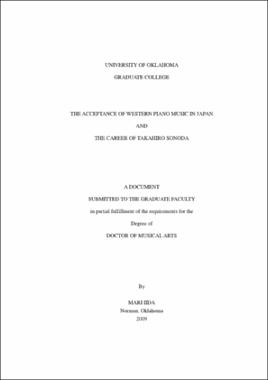| dc.contributor.advisor | Gates, Edward | |
| dc.creator | Iida, Mari | |
| dc.date.accessioned | 2019-04-27T21:25:50Z | |
| dc.date.available | 2019-04-27T21:25:50Z | |
| dc.date.issued | 2009 | |
| dc.identifier | 99187401402042 | |
| dc.identifier.uri | https://hdl.handle.net/11244/318664 | |
| dc.description.abstract | THE ACCEPTANCE OF WESTERN PIANO MUSIC IN JAPAN AND THE CAREER OF TAKAHIRO SONODA | |
| dc.description.abstract | By: Mari Iida | |
| dc.description.abstract | Major Professor: Dr. Edward Gates, D.M. | |
| dc.description.abstract | Western music was almost completely unknown until 1853 when Japan opened the country to the world. However, recently, young Japanese pianists have become very active in the field of international piano competitions. And Western classical-music concerts flourish in Japan to this day. It is obvious that Western music is rooted firmly in Japan. The author considers that there is a need of a succinct account that traces the progress of acceptance and popularization of Western music in Japan. | |
| dc.description.abstract | The purpose of this study is twofold; to reveal how Japanese people, who had no Western music tradition, reached this high level of understanding of Western music, especially Western classical piano music; and to provide a focus on the career of Takahiro Sonoda, the first internationally recognized Japanese concert pianist. It observes the process of acceptance and popularization together with concurrent social and political phenomena and deals with many figures and events that the author found significant and worthy of documentation. | |
| dc.description.abstract | Part one of the study, entitled "The Period of Acceptance," is devoted to a historical background related to pianists and teachers before 1928. It describes the drastic Westernization by the newly established Meiji government, which included adoption of Western music as a part of a national compulsory education curriculum. This government-led Western music education planted the seed of Western music in Japan. | |
| dc.description.abstract | Part two, entitled "The Period of Challenge," concerns musical events from 1928 to today and focuses on a biographical survey of Sonoda. It is a history of the challenge of closing the musical gap between Japan and the West. The performance techniques of Japanese musicians were advanced by the rise of musical media, the immigration of European musicians, the diversification of school music programs, and the success of domestic piano mass production. | |
| dc.description.abstract | The author found that the accomplishment of Western music acceptance and popularization was a natural outcome of the trajectory that began with the Meiji restoration and the opening of Japan to the West. Sonoda's achievement represents the last stage of 150 years of challenge and progress by Japanese pianists. | |
| dc.format.extent | 270 pages | |
| dc.format.medium | application.pdf | |
| dc.language | en_US | |
| dc.relation.requires | Adobe Acrobat Reader | |
| dc.subject | Piano music--History and criticism | |
| dc.subject | Piano music--Japan | |
| dc.title | The Acceptance of Western Piano Music in Japan and the Career of Takahiro Sonoda | |
| dc.type | text | |
| dc.type | document | |
| dc.thesis.degree | D.M.A. | |
| ou.group | Weitzenhoffer Family College of Fine Arts::School of Music | |
